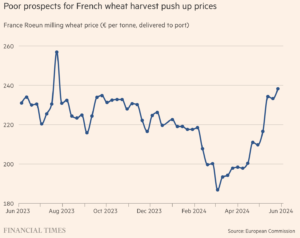
By Alban Robert, Student at IESEG Business School
The specter of a global food crisis loomed large over 2024. It is not difficult to remember the images of empty supermarket shelves and bread riots-images reminiscent of bygone famines. But are these fears merited or a matter of overblown gloom? This article dissects some of the contributing factors to food insecurity and possible measures to ensure a stable food supply for all.
A Perfect Storm: War, Weather, and Waste
The key disruptor has been the war in Ukraine, with both nations being big wheat exporters. According to the following Financial Times graph, global wheat prices have surged by over 40% since the beginning of the year. For the price shock, the worst hit will be in developing nations, where food purchases absorb the bulk of household income.

Climate change adds another layer of complexity. Droughts, floods, and other extreme weather events are hitting production all over the world. A study by the United Nations Foundation warns that climate change could reduce the yield production of some crops by as much as 30 percent by 2050, further stressing the supply of food around the world.
Food wastage, too, contributes to this problem. The FAO estimates that about one-third of all food manufactured for human consumption worldwide goes to waste. That is a billion tons of lost or tossed food every year, easily enough to feed the world’s hungry a number of times over.
Beyond the Headlines: Reasons for Optimism
The following might instill some optimism if there is any good news at all. With improved farming practices and possible drought-resistant crops, new technology in agriculture holds much promise for better yields. Investments in infrastructure for instance, better storage facilities will significantly reduce food wastage.
Moreover, the world is not producing inadequately in every sector. According to a recent article, Bloomberg reports that there are still comfortable rice stockpiles globally. In addition, countries are increasing the growth of other crops like cassava and plantains to supplement the food supply.
Beyond waste, surplus food can be reintegrated into the supply chain or recycled for alternative uses.
The Role of International Cooperation
International cooperation is one of the most critical elements in meeting the global crisis of food. Developed nations will have to support the developing nations through financial investment in sustainable agricultural practices and social safety nets. This would also be achieved through the smoothing of trade barriers and the removal of export restrictions, which sometimes hamper the flow of food into the neediest areas.
The institutional framework, particularly FAO and the WFP, is vital. The institutions provide technical expertise and coordinate relief efforts in areas facing food shortage.
The Way Forward: A Call to Action
There are no easy and simple answers to meet the global food crisis challenge. The drivers for the crisis, conflict, climate change, and food wastage are long term. Nevertheless, addressing the roots and fostering international cooperation would go a long way in averting full-blown catastrophe.
Every consumer can make a difference, too. It could mean the best practice on food wastage within homes or buying from forward-looking farmers or producers.
It is the kind of situation to give meaning the fragility at which food systems all over the world stand. What it demands is a multi-pronged approach that merges urgent relief with long-term investment in sustainable production and responsible consumption. This may further ensure safe and healthy food for everyone well into the future.

Alban Robert
Alban is a French student at the IESEG School of Management. He is interested in economics, finance, history, and technology. His goal is to pursue a career in corporate finance, where he will be able to apply his interest in numbers and his interpersonal skills.